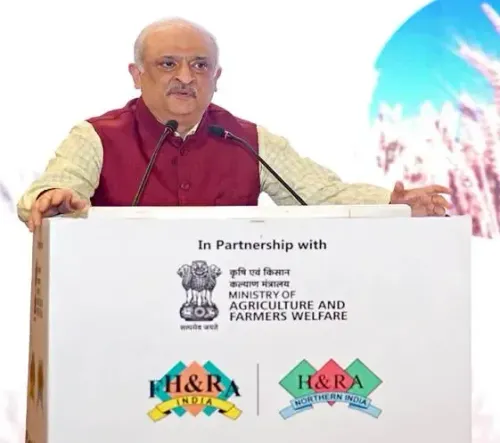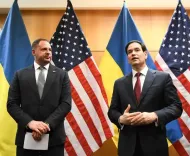Sensex and Nifty Close Lower Amidst Global Trade Concerns

Synopsis
Key Takeaways
- Indian stock markets declined for the eighth session
- Sensex closed at 75,939; Nifty at 22,929
- Pharmaceuticals and small-cap sectors were heavily impacted
- Global trade concerns influenced market performance
- Investor sentiment remains cautious amid economic uncertainties
Mumbai, Feb 14 (NationPress) The Indian stock markets experienced a continuation of their downward trajectory for the eighth consecutive session on Friday, with both the Sensex and the Nifty concluding in negative territory amidst ongoing global trade uncertainties.
At the end of trading, the Sensex, which dipped to 75,439 during the day, managed to recover slightly, closing around 200 points lower at 75,939.
Similarly, the Nifty dropped 102 points or 0.55 percent, closing at 22,929.
Among the notable losers on the Nifty index were Trent, Grasim, Bajaj Auto, Hero MotoCorp, and Sun Pharma, with losses ranging from 2.5 percent to 5 percent. The pharmaceutical sector was significantly impacted.
Stocks like Natco Pharma and Laurus Labs saw their values plunge by over 9 percent, while other companies, including IFCI, Glenmark Pharma, Finolex Cables, HFCL, and BEML, experienced declines exceeding 7 percent.
The Nifty Smallcap 100 index fell nearly 4 percent, closing at 15,373.70, marking a sharp decline of about 22 percent from its peak of 19,716.20.
The broader market also endured significant selling pressure, as the Nifty Midcap 150 index decreased by nearly 2.5 percent, settling at 18,325.40.
Market analysts linked the prolonged losses to weak investor sentiment and worries regarding global economic uncertainties.
Concerns over global trade heightened after US President Donald Trump signed an order directing the Trade Representative and the Commerce Secretary to formulate new country-specific tariffs. Additionally, Trump announced intentions to impose further import taxes on critical industries, including automobiles, semiconductors, and pharmaceuticals.
According to Vinit Bolinjkar, Head of Research at Ventura Securities, markets opened positively due to optimism surrounding the Trump-PM Modi discussions but quickly shifted to negative as trade war fears dominated sentiment.
“Crude oil prices rose after the U.S. postponed tariff implementation, yet the broader market sentiment remained cautious,” he stated.
Throughout the week, both Nifty and Sensex encountered resistance at elevated levels, prompting profit booking. Global macro uncertainties and mixed earnings reports left investors feeling apprehensive.









